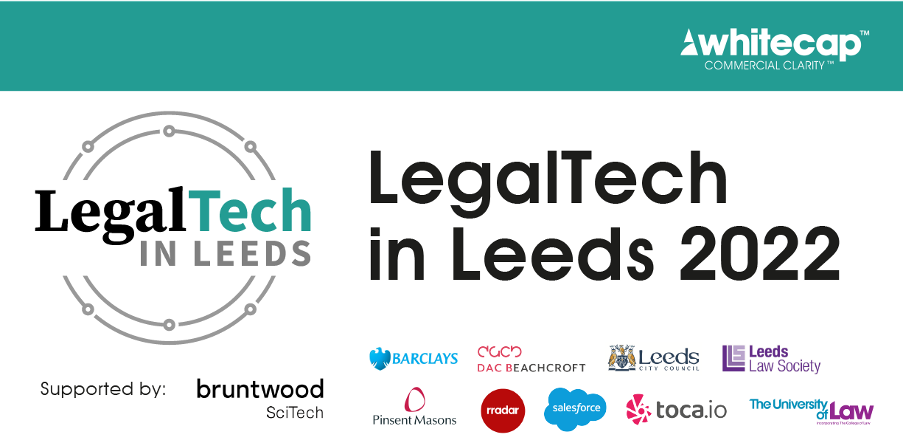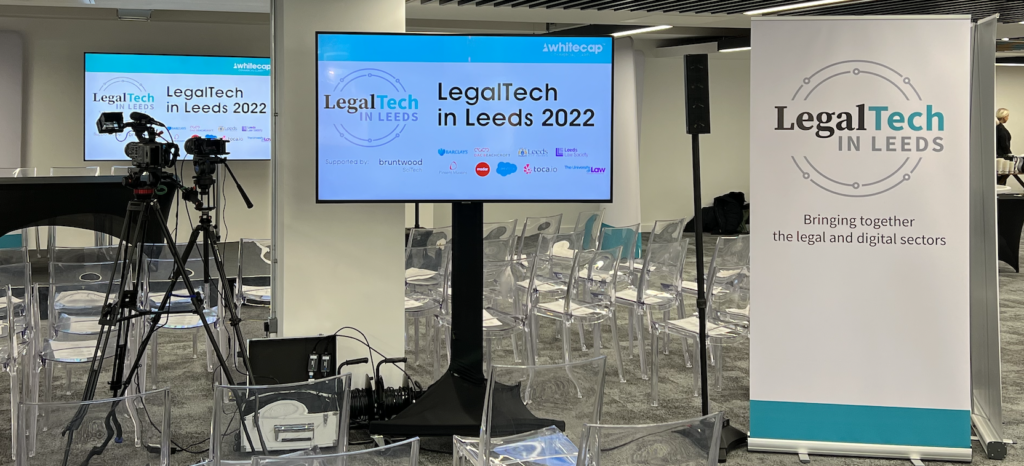 At the conference we welcomed new and familiar faces at what was our third event of the LegalTech in Leeds programme, having hosting two prior drop-in sessions over recent weeks (read the write ups here)
At the conference we welcomed new and familiar faces at what was our third event of the LegalTech in Leeds programme, having hosting two prior drop-in sessions over recent weeks (read the write ups here)
A huge thank you to the organisations that have supported and funded this initiative: Bruntwood SciTech, Barclays, DACBeachcroft, Leeds City Council, Leeds Law Society, rradar, Pinsent Masons, Salesforce, Toca.io and University of Law.
For those who could not attend the conference, we have produced a write-up of the entire day as well as a recording of the event which is embedded below. Please read on to find out more.
Julian Wells, Director at Whitecap Consulting first kicked off proceedings introducing Whitecap, a regional strategy consultancy headquartered in Leeds, followed by outlining the LegalTech in Leeds initiative. The key aim of the initiative has been to bring together the legal and digital sectors, and in doing so to help drive digital adoption, support entrepreneurs seeking to work in LegalTech, and improve access to legal services.

The second speaker was Tom Matusiak, director at Leeds Law Society and Legal Director at Stewarts, who reflected on the history of law within Leeds, stating the region is the “UK centre of excellence for legal services outside of London”.
Tom highlighted the 150 years of support that Leeds Law Society has given to promoting the legal industry in Leeds and talked about how the industry is at a critical juncture, making reference to Whitecap’s 2020 Leeds City Region Legal Tech & Innovation report. The report provided many examples of strengths and success stories of LegalTech and Innovation in Leeds and highlighted the importance of collaboration for the future.
Eve Roodhouse, Chief Officer Culture and Economy at Leeds City Council, joined us to discuss how the council is supporting sector development across the region, making specific reference to the work that has been delivered in the digital and legal sectors.
Eve reflected on the progress that has been made in LegalTech and innovation since 2019, stating it was exciting to finally have a physical manifestation of the effort that has been put in from multiple supporting organisations in order to try and maintain and develop the region’s status as a leader in innovation in the law. Eve also discussed the strength of the region’s digital sector stating that Yorkshire currently has the fastest growing digital sector, which is made up not only of large corporates but also by startups, scaleups and SMEs.
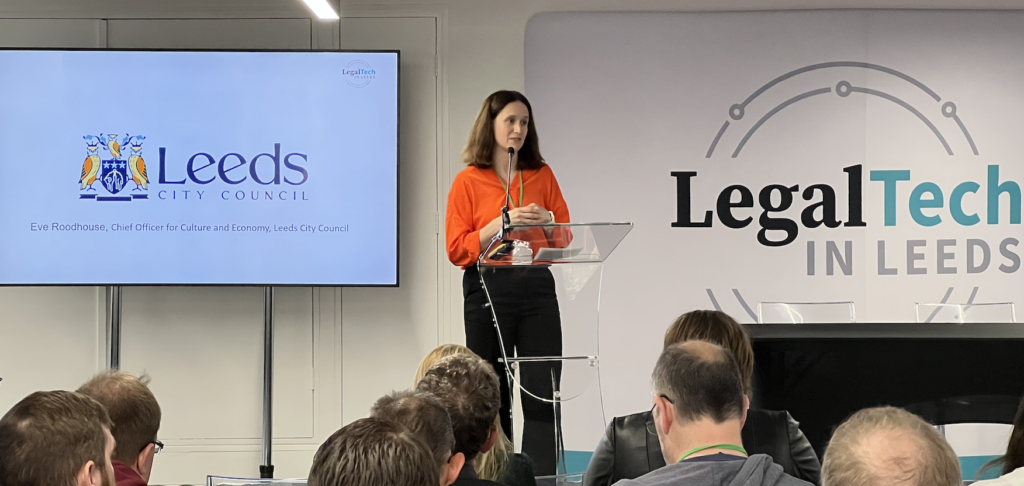
Eve then talked about the commitment from the public sector to invest in the innovation ecosystem across the region, demonstrated by the council’s support of the LegalTech in Leeds initiative. The welcome was finished with a consideration of the history of innovation in Leeds, making specific reference to Freeserve and the NHS and summarising with the quote:
“Dream big, there is no reason why Leeds can’t be the place that transforms how we deliver the law, how we ensure people have access to law and how we make sure corporate law firms are fit for the future in a disruptive world of tech.”
After the welcomes and opening remarks, we had our first keynote. Ben Wagenaar, Head of Innovation and Technology at the Solicitors Regulation Authority (SRA), talked about the three strategic objectives of the SRA including: to set and maintain high professional standards for solicitors and law firms; to actively support the adoption of technology in the legal sector and to continually build understanding of emerging opportunities and challenges for the legal sector.
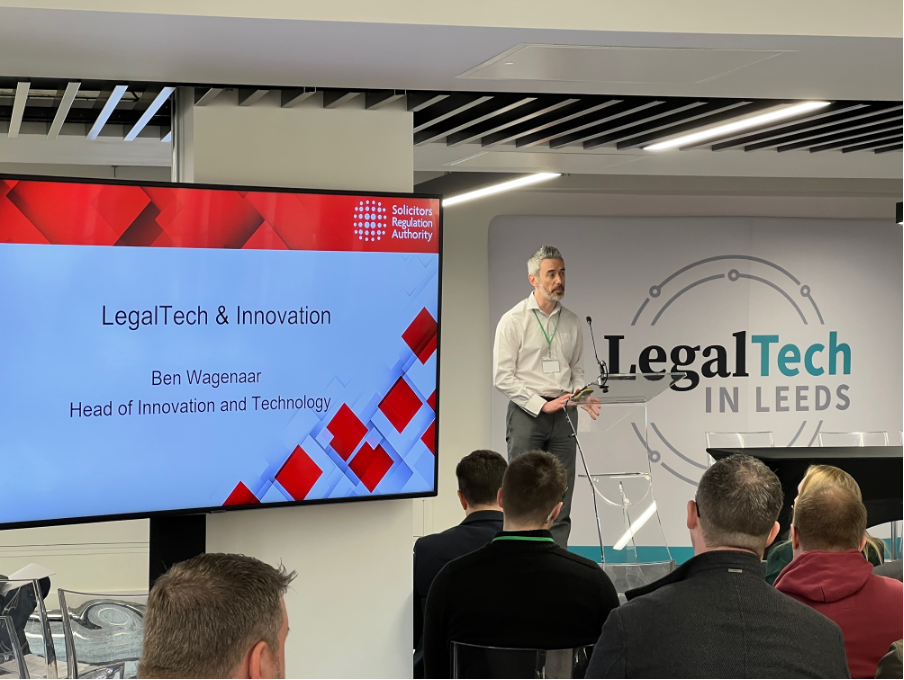
Ben shared the key findings of the recently published Innovation and Technology Legal Services Report highlighting the step-change in technology use through the pandemic. For example, 55% of the population have increased their use of technology throughout the pandemic and 90% stated these changes would be permanent. Despite this, between 2014 and 2020, only 1-2% of regulated lawyer job adverts mentioned requiring LawTech skills from applicants.
Ben finished by talking about the SRA’s access to justice project which aims to “create a new network where regulators, expert research institutions and local government can work together to help overcome some of the access to justice barriers.”
Our next keynote was Gary Gallen, CEO of rradar who highlighted the importance of people over technology when thinking about innovation, stating that its fundamental for legal practitioners to focus on what the client needs. Law firms need to focus on how they deliver legal expertise to their clients faster, smarter and better, shaping their business plans around this.
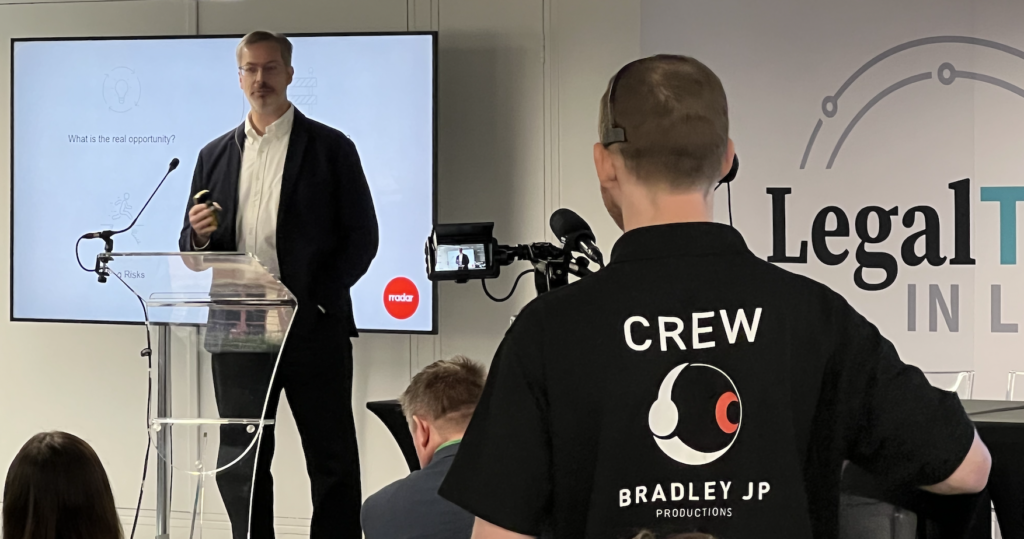
Gary stressed there will always be a need for lawyers and their knowledge, despite developments in technology, and that plenty of challenges that businesses are facing require legal expertise. Therefore, rather than protecting their knowledge, lawyers should embrace the opportunity to support and educate businesses, who in turn are more likely to return looking for their support. Gary finished with the quote:
“Think about your knowledge, your control point, and the opportunity you have now. Don’t sit on it!”
We then had a panel chaired by Julian Wells, Director at Whitecap Consulting on the topic of LegalTech and Innovation. Our panel members included: Georgia Halston of RegTech Talks & No Code Lab, Luke Corcoran from Government Legal Department and Leeds Law Society, Gary Gallen, , Sherin Matthew, CEO and founder of AI Tech North, and Deb Hetherington, head of innovation at Bruntwood SciTech.
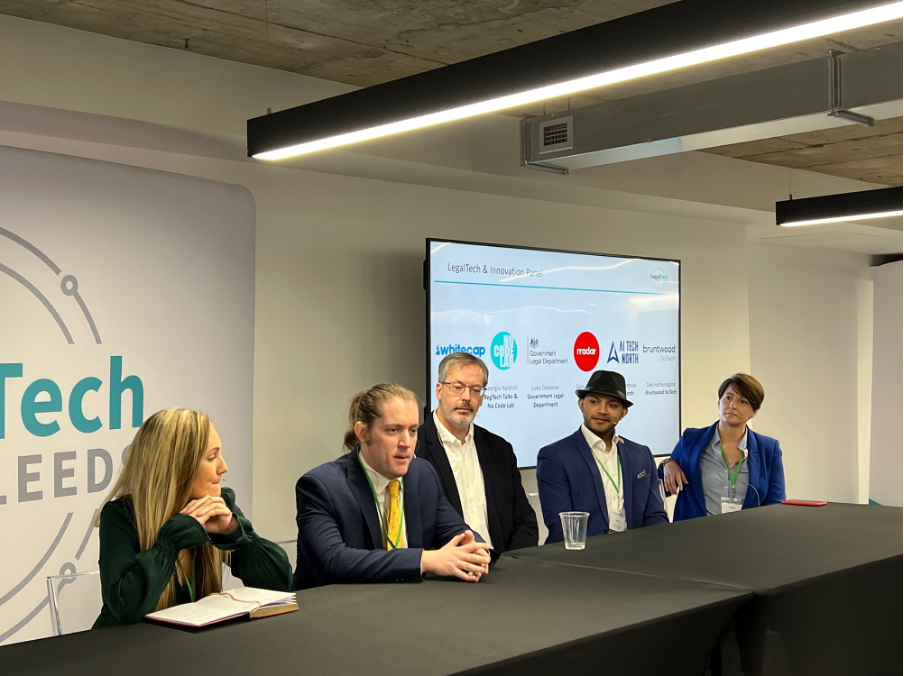
The panel discussed the current lack of digital adoption across the legal sector with Sherin stating that there is a lack of understanding of how to use tech such as AI as well as a culture that is resistant to change. Georgia talked about how despite the fear of digitisation, the pandemic has forced many traditional businesses like law firms to adopt technology, stating that these changes are now embedded in working practices.
Luke shared his views from a public sector perspective saying that mature tech that is easily rolled out and adopted by lawyers is generally easier to engage with for the Government Legal Department due to there being less of a commercial imperative compared to law firms in the private sector.

Gary went on to discuss the role that culture has to play in innovation, reflecting on the culture of rradar and the importance of employees having a space where they can think differently. An important part of rradar’s culture is also having different business disciplines under one roof and not recruiting from traditional backgrounds.
After a short break for refreshments and networking, there was a fireside chat with Jenifer Swallow, Director at LawtechUK. Jenifer spoke about how the legal sector needs to change through two primary dimensions: the first being business and the second being people. Jenifer feels the sector has a lot of catching up to do in terms of digital adoption and innovation, stating that less than 1% of a typical law firm’s revenue is reinvested back into innovation.

Jenifer then outlined the vast amount of unmet legal need in the UK (£11.6bn per year) and talked about the success of the Lawtech Sandbox, which was created to fast track transformative ideas, products and services that address the legal needs of businesses and society. Jenifer finished with some advice for the tech sector:
“There is no shortage of opportunities in the legal sector. Incumbents need to be disrupted by tech startups because the challenges they face aren’t going to be solved by lawyers, they need people with different ways of thinking and different skills to redesign the paradigm.”
Next up, we heard from Irana Richards, Head of Professional Services at Barclays who talked about the success of Barclays Eagle Labs in helping starts-ups to scale-up and grow. Irana highlighted the slow adoption of technology across the legal sector stating that over a timespan of over 30 years, there has been some automation and standardisation but nothing that has significantly changed the landscape.

Irana discussed examples of advancements in LawTech outside of the UK, making specific reference to cloud-based law software provider Clio, the world’s first legal profession management unicorn. She highlighted the potential opportunity of the LawTech market, stating that it is a huge area for growth. Irana finished by talking about the importance of ESG considerations when advising clients stating that there is a lot more work to be done and posing the question, could the tech sector help legal services with its ESG efforts?
Patrick Grant, Senior Tutor and Project Director of Legal Innovation & Technology at The University of Law, spoke about how 21st century law students need a different insight to those taught previously. Patrick discussed how law students of today need to understand the importance of innovation and technology in the context of legal services.

Modules offered to undergraduates at The University of Law have been designed to provide law students with the skills and knowledge they will need to navigate the tools they will come across in practice. For example, a LegalTech and Innovation module gives students a gentle introduction to process mapping and understanding law as a process whilst the Legal Practice in 21st Century module provides an understanding of how modern law firms operate, focusing on skills such as project management and digital marketing.
Ensuring students leave university with current and well-rounded skills and knowledge in technology and innovation, core business practices and ethics is the basis of the courses and modules offered at The University of Law.

Our next panel discussion on the topic of The Future of Legal Services was chaired by Nigel Brook of Tyr and Leeds Law Society. The panel featured Diya Okorie, Partnership Strategy Manager at Northcoders, Emma Pearmaine, Managing Director at Ridley & Hall, Matt Peacock, Managing Partner at OMC Partners, Dr Anna Elmirzayeva, National Lead for Legal Technology and Innovation at The University of Law, and Chrissie Lightfoot, CEO of EntrepreneurLawyer.
The panel discussed the rapidly changing demand for legal services with Matt talking about some of the technology and efficiency approaches that could be seen across the sector pre-pandemic, mostly driven by client needs and expectations. However, over the course of the pandemic, clients understandably shifted their focus from Business As Usual to keeping operations afloat. Somewhat distracted, client pressure on law firms to innovate and follow the pre-pandemic rules around efficiency and fixed-fee pricing diminished. The balance of power is now moving back towards clients.
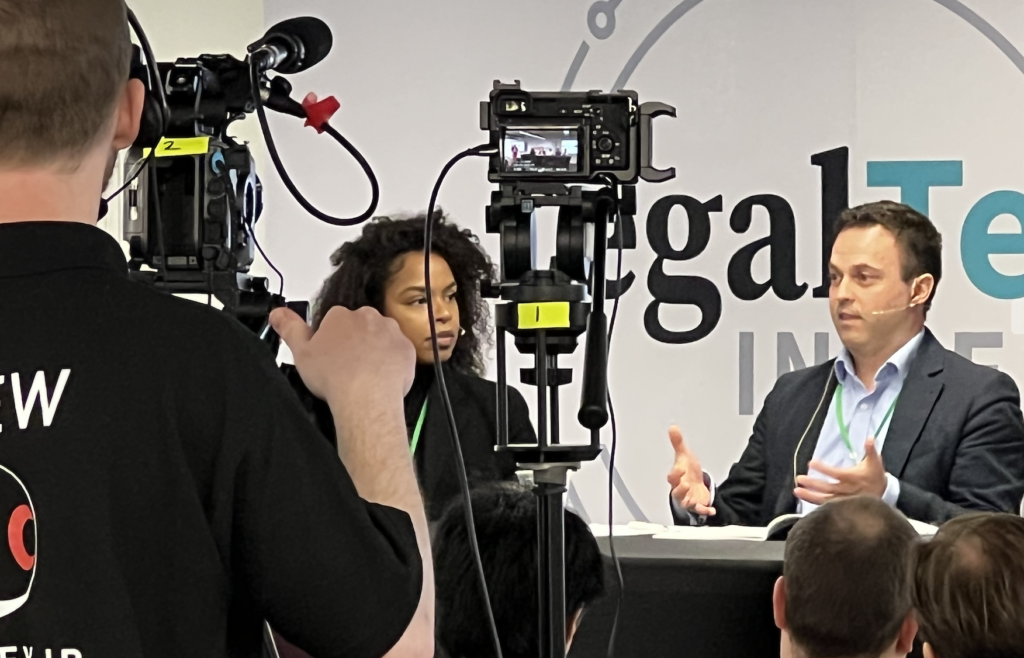
Emma provided the perspective from a B2C law firm, stating that the pandemic was a “game changer” as it encouraged the sector to think about the needs of future clients and how technology can be used to deliver them.
Anna then spoke about crypto assets and blockchain and the increased need for lawyers in the future to understand how this technology will affect our lives. Anna stated that “it’s not a question of if it will enter your industry, it’s a question of when”.
Chrissie agreed with this sentiment and stressed the importance of horizon scanning when you are preparing for the future. Chrissie talked about the metaverse and how lawyers need to be aware of changes and innovations in the physical world as well as the VR world, ensuring that legal services can be delivered in both. Chrissie finished with the quote:
“You want to use technology for a purpose and adopt technology that is relevant to the solution you are trying to solve for your client.”
Diya concluded the panel discussion by talking about the recruitment of developers and the role that apprenticeships and bootcamp services can play in making it more affordable and sustainable for SMEs. Northcoders is encouraging smaller businesses that lack financial resource to make the most of the levy fund to upskill and retrain staff in house.
 After delegates enjoyed a lunch and networking break with a showstopping grazing table and an iPad magician, we returned for an insightful conversational session with Tom Riordan, Chief Executive of Leeds City Council answering questions posed by Eve Roodhouse, Chief Officer for Culture and Economy.
After delegates enjoyed a lunch and networking break with a showstopping grazing table and an iPad magician, we returned for an insightful conversational session with Tom Riordan, Chief Executive of Leeds City Council answering questions posed by Eve Roodhouse, Chief Officer for Culture and Economy.
Tom opened the discussion by reflecting over the last couple of years, stating that there has been a huge upheaval which has led to significant changes to the labour market. Today, competition for talent is intense and one of the biggest challenges faced by businesses is attracting and retaining high quality people. Eve then asked Tom, “What brings people to Leeds?”, to which he replied:
“Leeds has always been a great city; it’s well located and has six fantastic universities which has changed the dynamic and diversity of the region.”
Tom explained that more students are staying in Leeds after they have finished university compared to before and large amounts of money are being invested into the city’s social appeal as well as the economy; demonstrated through the £650m Leeds South Bank regeneration project.

Tom and Eve then went on to discuss the confidence that the commercial property market has in Leeds which is clearly visible through all the development and building work going on throughout the city.
A recent initiative from Leeds City Council has been the Innovation@Leeds scheme which aims to provide a launchpad for the next generation of business innovators by providing training, mentoring and other forms of support for people aiming to develop their own innovation-led businesses. Funding from this initiative enabled the LegalTech in Leeds concept to be created and developed.
Tom finished by praising the “Yorkshire attitude” of the region stating that people in Leeds find their own solutions and get things done. The session concluded with the inspiring quote:
“If you’re going to change the world, theres no better place to change it than Leeds. It’s big enough to have scale, but small enough to get your arms around.”
The final session of the day was an afternoon of quickfire reverse pitches which saw six law firms discuss their key challenges and what they have been doing to progress their digital transformation and high energy pitches from ten tech firms pitching their potential solutions to the legal sector.
To find out more about each company, please see the website links below:
DAC Beachcroft – Peter Allchorne, Partner
This global law firm has adopted a challenge/ problem first approach to innovation, using an ideation platform to identify potential solutions that can be incubated and stress tested.
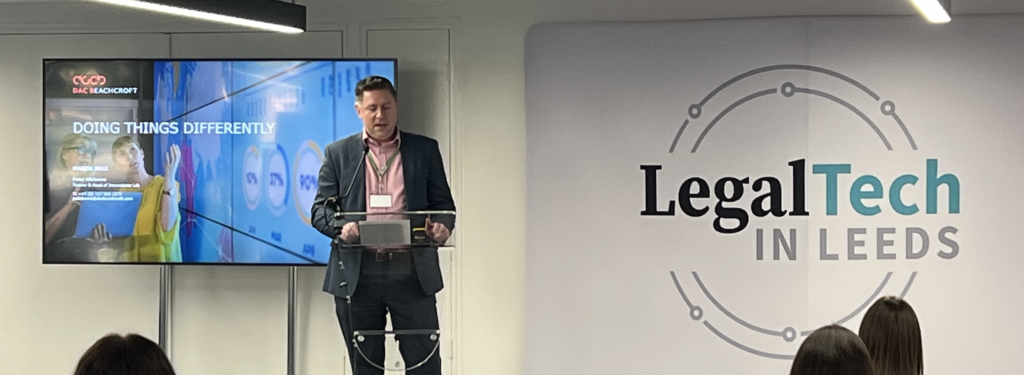
Calls9 – Adam Roney, Founder & CEO
A digital innovation and transformation agency that helps businesses to disrupt the sector and transform outdated service offerings to new business models.
Focis – Paul Ryan, Director
Focis is a tech firm that designs, develops and delivers solutions within the legal sector. Focis integrates into existing software so that they do not have the risk of replacing legacy systems.

Pinsent Masons – Sarah Wilson, Head of Product Services
The global law firm which outlined some key challenges that could be potentially solved through technology. For example, project and task management and large-scale document reviewing.
Toca.io – Keith Sutton, Business Development Director
Toca pitched its no-code enterprise development platform which allows organisations to rapidly build digital veneers on top of existing systems and processes. Based in Reading, the team from Toca have been frequent visitors to Leeds over recent weeks and on 31st March they are back again to take part in the No Code Hack, hosted by No Code Lab, which is open to all to attend.
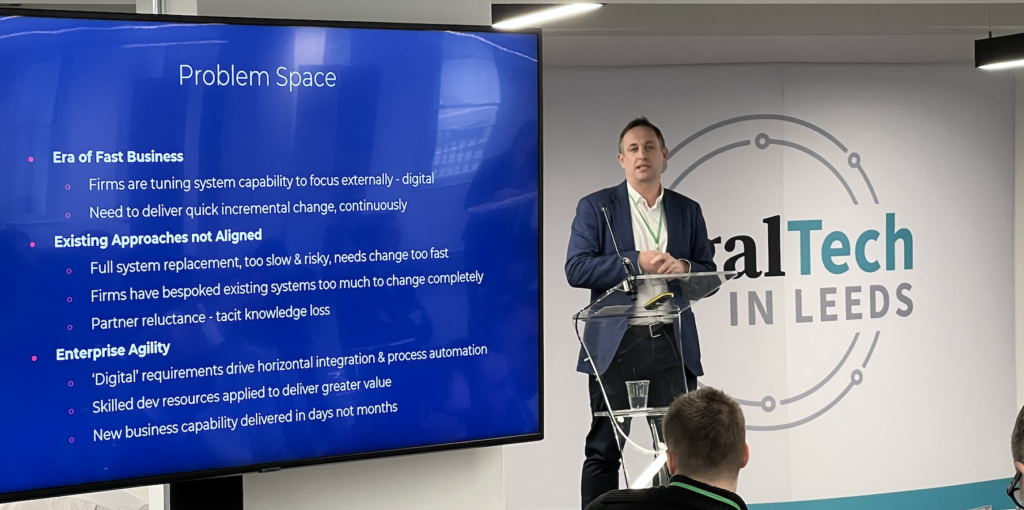
Page White and Farrer – Andrew McKinlay, Senior Associate
A patent and trademark attorney firm that helps companies to identify valuable intellectual property, protect it and enhance its worth. Page White and Farrer can work with tech firms as partners, but also as clients, as its services are valuable to the tech sector.
JUST: Access – Sophie Walker, Director
A tech firm that removes the need to manually transcribe interviews and calls by providing an AI enabled transcription tool with an open data approach.
Burendo – Amy De-Balsi, Associate Director for Brand and Austen Bell, Founder
A Leeds-based business transformation consultancy which specialises in highly complex projects and agile methodologies to support businesses at any point of the digital transformation journey.
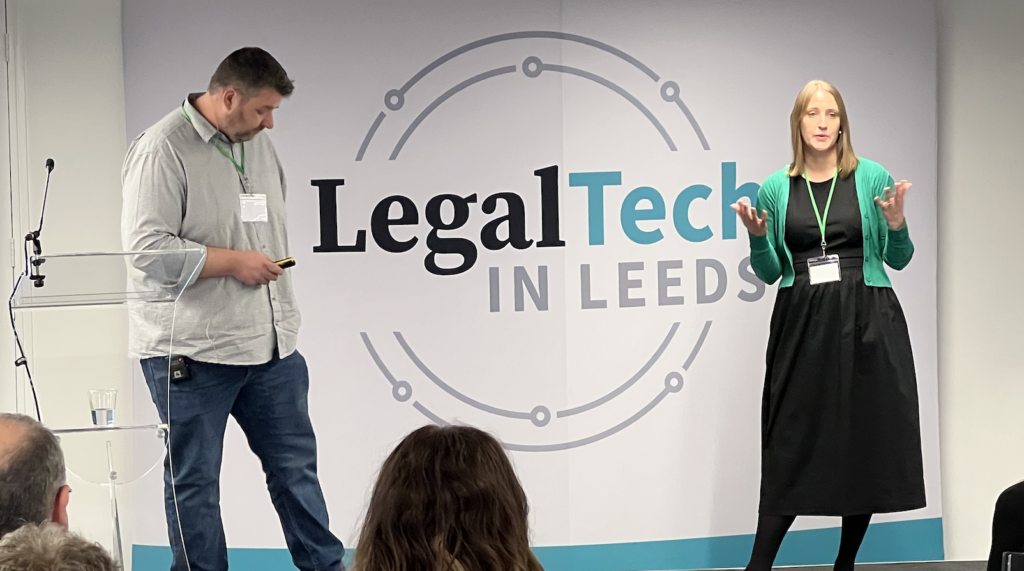
Ward Hadaway – Connor Simpson-Key, Solicitor
The law firm explained some of its challenges with regards to the amount of dedicated tech resource in-house and difficulty it can experience in navigating the tech solution landscape, expressing a desire to better understand the tech available that could help Ward Hadaway to grow.
Freelance IT Director, Alex Hutchinson
Alex is a freelance IT director for small to medium sized law firms and has created a six stage Digital Evolution Framework that allows law firms to tackle the tech challenges they are facing.
Prinsix Technologies – Julian Graham-Rack, CEO
PrinSix is a Leeds-based startup which focuses on empowering businesses to create and control high performance digital journeys that are agile, insightful and customer centric through moving execution out of IT and into operational teams.
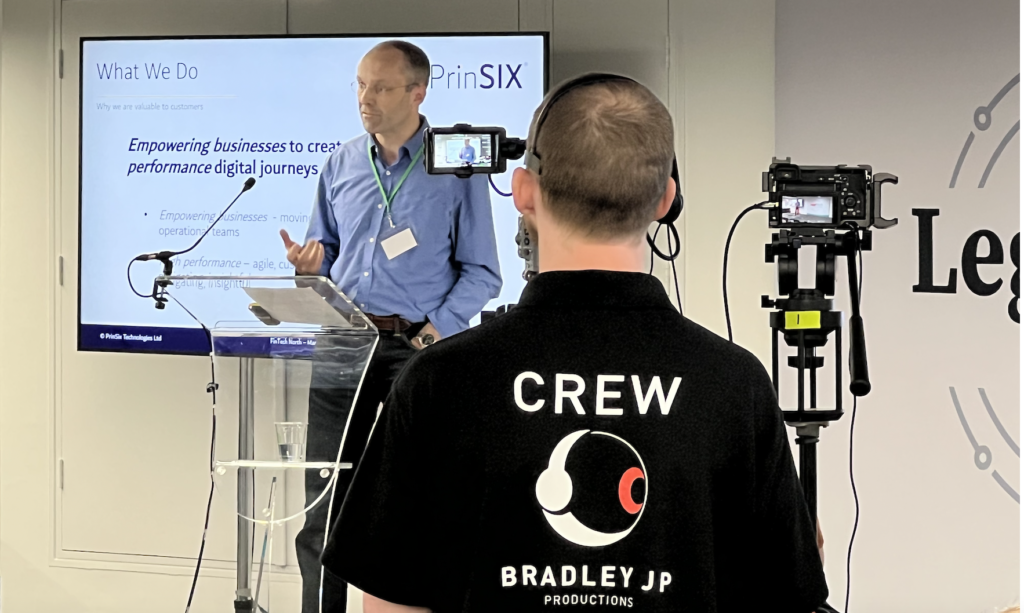
xDesign – Jeff Watkins Chief Product and Technical Officer & Matt Ward, Head of Leeds
A digital delivery partner that looks at designing and delivering solutions through an engineering lens, ensuring the focus is on outcomes rather than features. The approach is to understand as much as possible about the challenge at hand with the aim of helping clients to extract as much value as possible in the quickest time.
Eversheds Sutherland – James Grice, Senior Legal Service Design Manager
The global law firm has created a legal service design team after identifying a lack of efficiency and integration across the different areas of the business. Eversheds also hosted a global hackathon which resulted in a portfolio of high-quality ideas for potential solutions.
LION+MASON – Andrew Machin, Director & Founder
A product design & UX consultancy specialising in the research, strategy, and design of user-centric digital products & services. LION+MASON starts by focusing on what will create value for a client’s customer and base the strategy around that.
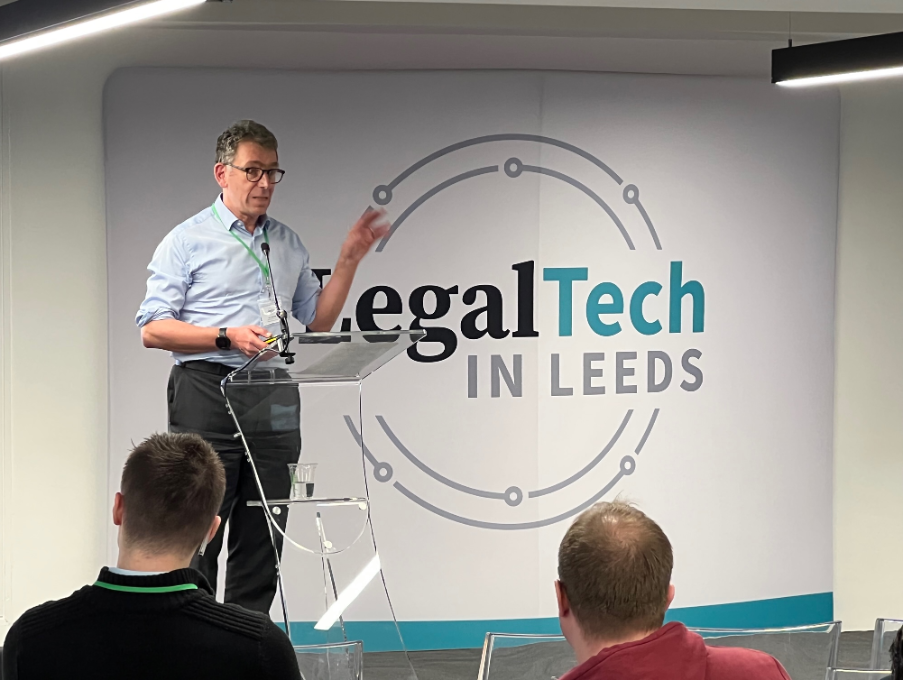
Berwins – Paul Berwin, Managing Director & Head of Digital
A locally headquartered law firm based in Harrogate and Leeds, Berwins has a digital division called Berwins Digital, which includes specialist lawyers advising tech businesses on commercial agreements, data protection, IP and investments. Berwins has been undertaking a programme of digital transformation and Paul shared some insights and learnings from this work.
SYKE – Alistair Maiden, CEO & Founder
This fast growing legal technology consultancy helps corporate legal teams choose, buy and implement legal technology, leading the field in legal tech innovation. Global clients include Facebook and Google. Founded just over 5 years ago, the firm has already grown to 170 people and aims to reach 300 by the end of 2022. Alistair highlighted that the firm would like to receive more applications from Leeds-based candidates for its vacancies, and would also like to work with more Leeds-based organisations. After the conference, a queue of University of Law students formed in front of Alistair!
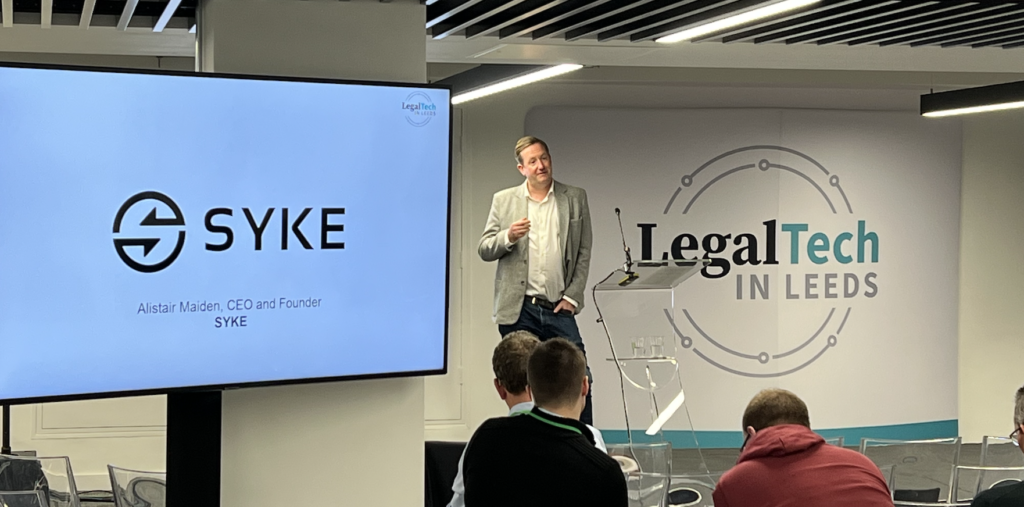
Bringing the day to a close, Julian Wells made some closing summary remarks and thanked everyone involved in making the event a success. This was followed by a networking session over cocktails and canapés at nearby Manahatta bar.
In addition to all the speakers, sponsors and attendees, we’d particularly like to thank our headline sponsor and venue host Bruntwood, who did a brilliant job ensuring we had a first class venue for the conference (which was supported by Pink Gorilla Hairy Lemon (catering and event management), FireFly AV (AV and staging), Bradley JP Productions (video and live streaming). We are also grateful to the students from University of Law who helped out on the day with registration and managing the Q&A sessions.
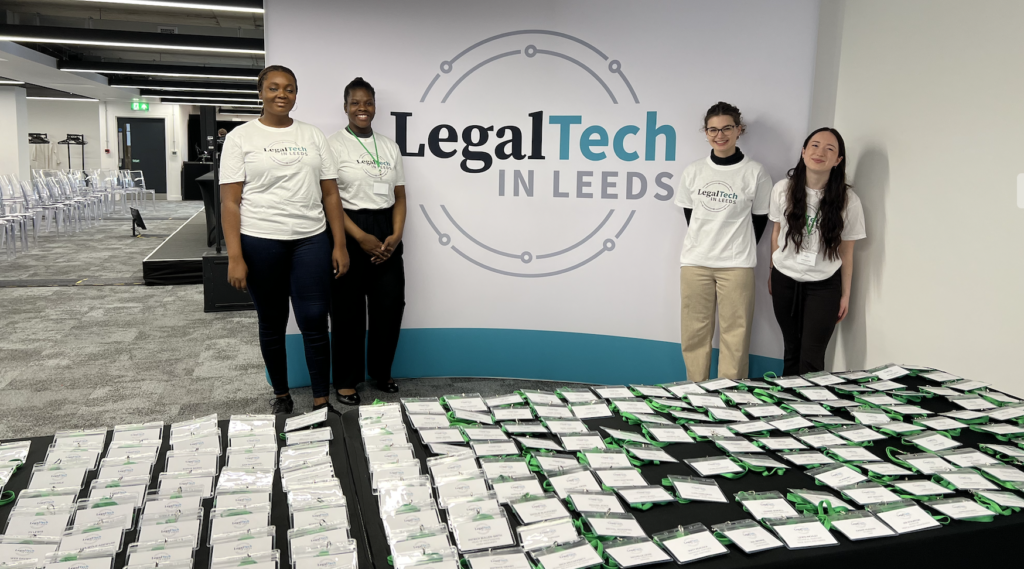
What did you think of LegalTech in Leeds?
We are keen to know your thoughts/ feedback on the conference as well as the interest for future LegalTech in Leeds events. Please take 5 minutes to fill out our Feedback Survey.
Thank You!
What is next for LegalTech in Leeds?
Recent weeks have proven there is an appetite for practically focused events that help bring together the legal and digital sectors. We will be discussing potential future activities with the project steering group and evaluating ow best to build on this initial programme of events. In the meantime, there will also be a follow up seminar to be hosted at Pinsent Masons on a date yet to be confirmed.
If you’d like to get involved in future activity, please contact us on [email protected]
